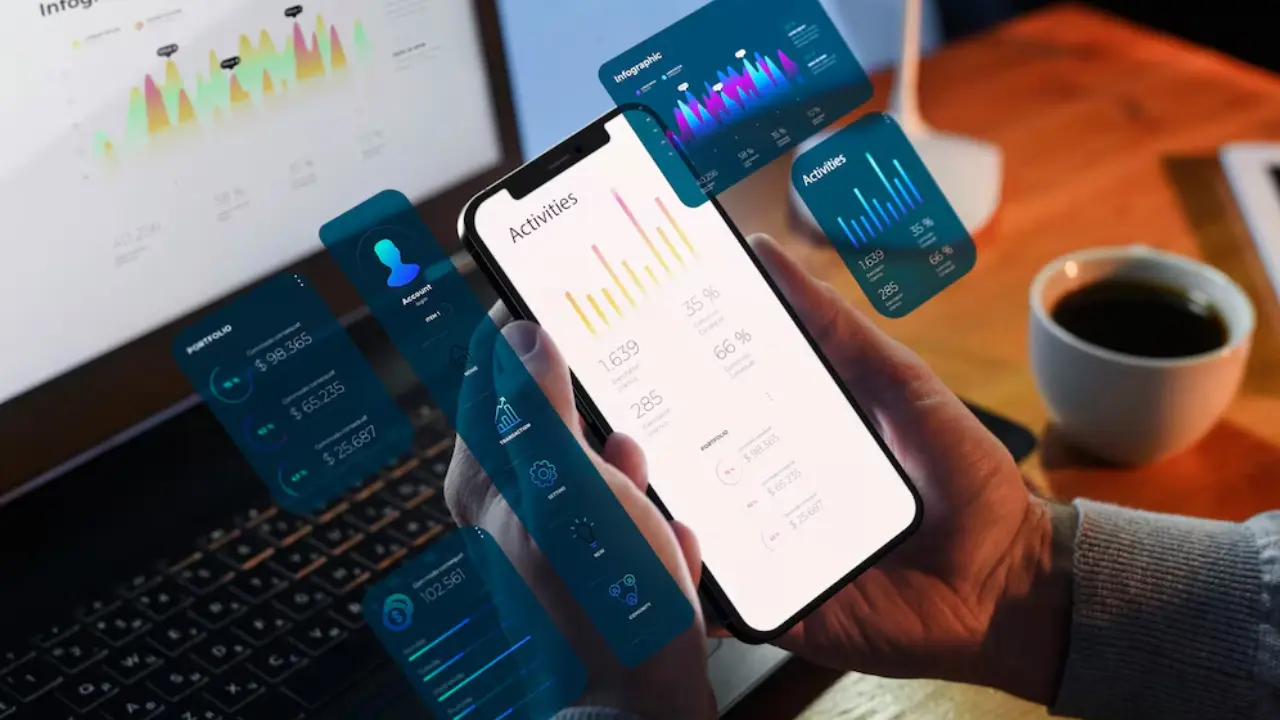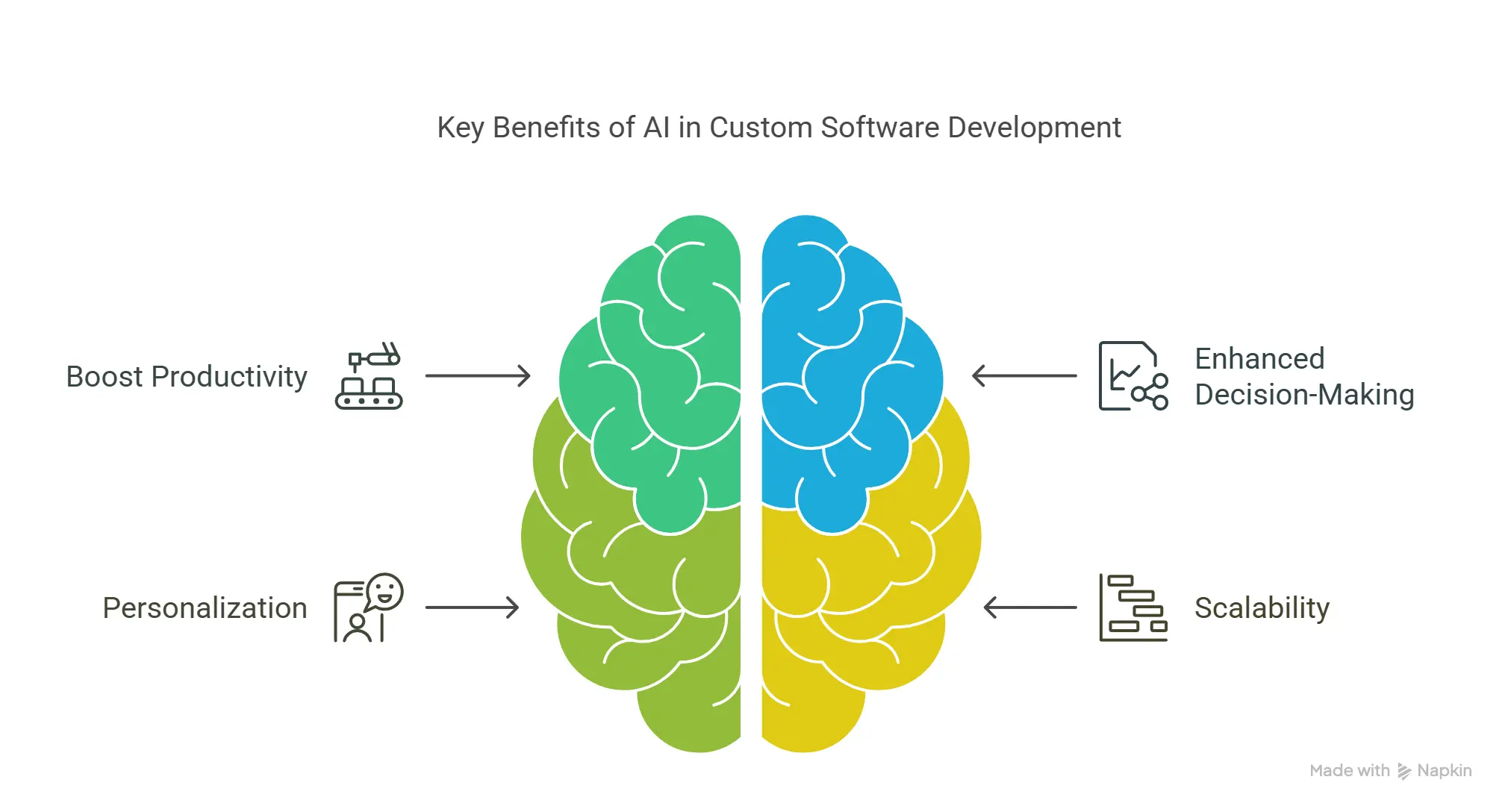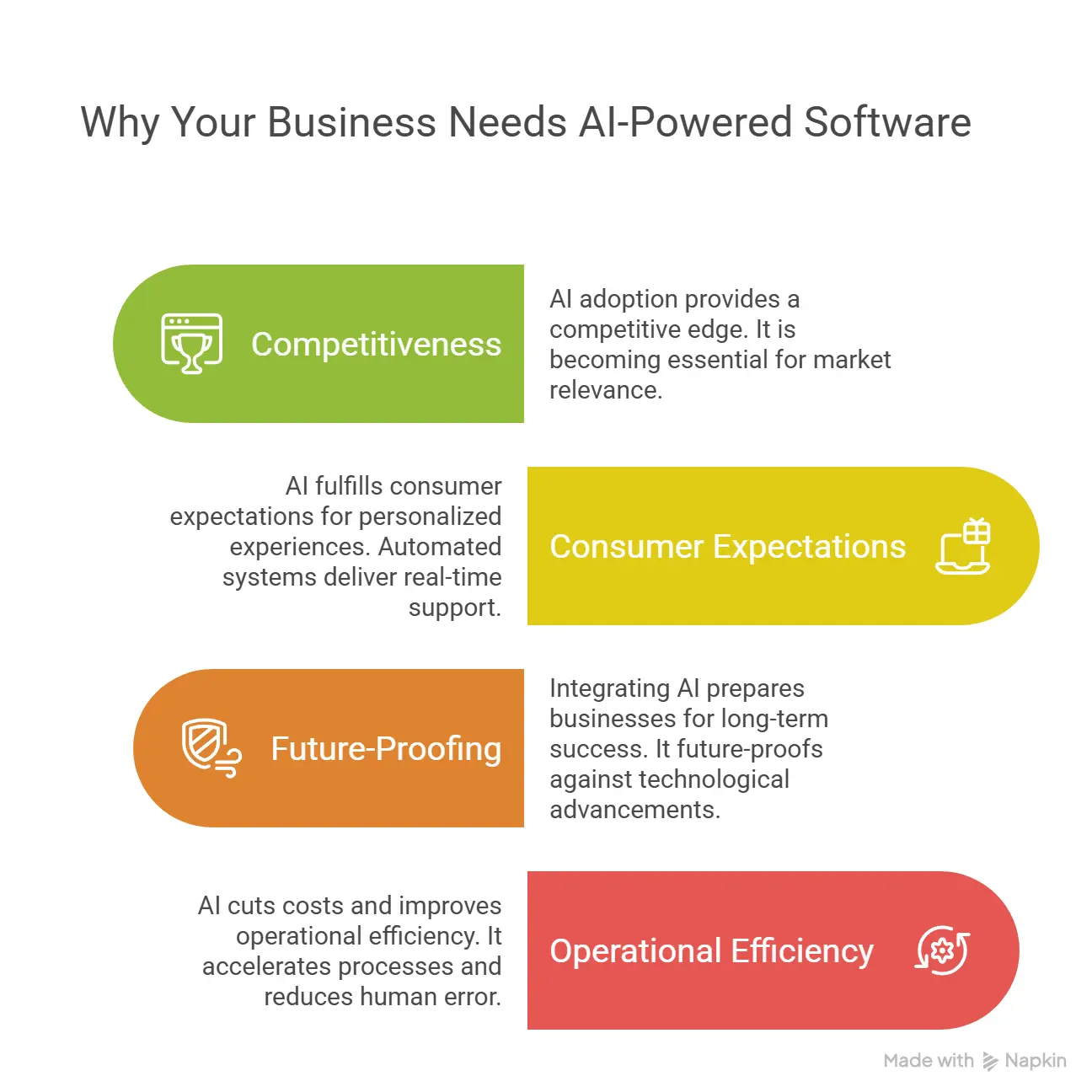In today’s rapid pace of life, AI mechanisms have been renowned in the field of software development innovation. Companies across the industries use AI in running their operations, enhancing user experiences, and growing their clients. From merely automating mundane tasks to building predictive analytic models, AI-powered software’s has indeed changed the way we function and live.
In this article, we go into the great depth of AI impact in software development, shedding light on the benefits it brings, the industries that it transforms, and why the adoption of AI is so vital to remaining competitive today. AI is not just for the tech market; it’s for everyone. Here is how AI affects various industries.
How AI is Revolutionizing Industries
AI will not only find a place in the dictionary as the latest buzzword, but it is also now changing industries and drastically altering the ways in which businesses are run. Machine Learning (ML), Natural Language Processing (NLP), predictive analytics, and AI-driven automation are advancing into mainstream business practices, enabling new solutions that are more intelligent, efficient, and personalized.
The following is a review of some ways AI is reshaping the landscape in various sectors:

Real Estate
The domain of property management in real estate, enhanced buyer experiences, and improved investment decision-making by AI features give it all. AI algorithms can analyze vast amounts of real estate data-from market trends to property values- to help investors make smarter decisions.
- AI Property Valuation: AI processes historical, local, and market behavior data to predict property prices with amazing accuracy.
- Predictive Maintenance: AI will forecast when appliances or systems are likely to break down based on data, enabling property managers to save on expenditure and be proactive in repairing.
- Virtual and Augmented Reality Tours of Houses: With the broad adoption of AI-powered augmented reality (AR), agents and businesses can offer potential homebuyers a virtual tour of their property-a much more engaging visit domes away.
- Decision Making: AI has recently made it great in property management, improved buyer experience, and optimization of investment decisions. AI algorithms analyze data-from the market trends to property values-in real estate, making investors more informed in their decisions.
- AI Property Valuation: AI processes historical, local, and market behavior data to predict property prices with amazing accuracy.
- Predictive Maintenance: With property managers, AI predicts the time of likely breakdown of appliances or systems, thus less expenditure and prompt repair.

Media & Entertainment
AI has transformed the media and entertainment industry with personalized content recommendations, content creation and real-time editing. AI is the force behind everything from Netflix recommendation to automated video editing tools.
- AI-based Content Curation: Streaming platforms such as Netflix, Spotify, and YouTube utilize AI to analyze users' viewing and listening habits and make personalized content recommendations. This improves audience engagement and retention.
- Automated Video & Audio Editing: AI provides automation to the editing process with respect to video footage, sound enhancing, and even real-time special effects, thus giving efficiency to the content creation process.
- Sentiment Analysis: AI tools are being used to scan social media and customer reviews, thereby providing snapshots of public opinion on movies, shows, or music and then using this information to customize the product to its audience preference.

Logistics & Supply Chain
AI is the most important end-user of logistics for improving efficiency, minimizing costs, and improving delivery management. From trucks without drivers to predicting analysis for supply chain optimization, AI is being utilized to make the supply chain smarter and more agile.
- Route Optimization: AI systems are used by companies such as FedEx or UPS for optimizing the routes, reducing fuel consumption, and cutting down delivery time.
- Inventory Management: It uses algorithms that predict inventory requisition based on analysis of seasonal changes, historical data, and current demand to keep stocking optimal inventory levels.
- Autonomous Vehicles: AI will become the main component of self-driving trucks, which are expected to carry heavyweight goods across a region or country using lesser workforce and reducing inaccuracies that increase charges in transportation.

Retail / FMCG (Fast-Moving Consumer Goods)
AI has changed the landscape for retailers or FMCG companies in their approaches toward customers, managing inventories, and creating personalized shopping experiences. AI allows companies to anticipate customer needs and channel their marketing efforts productively.
- Personalization of Shopping Experiences: AI recommendation systems suggest products based on a customer's prior browsing history and purchasing behaviors; retailers such as Amazon and Alibaba use this tool to great effect.
- AI Chatbots: Retailers have implemented AI chatbots in an effort to provide fast customer support with issues, the aiding of product recommendation, and other services to improve overall customer care.
- Demand Forecasting: AI has equipped companies to build more accurate product demand forecasts, enabling the optimization of stock levels and minimizing the possibility of overstocking and understocking.

Automotive
In the automotive industry, AI has engineered the future of autonomous vehicles and smart manufacturing. Self-driving cars, AI-powered traffic management, and predictive maintenance will come in a lot sooner than you could think.
- Autonomous Vehicles: Tesla and Waymo use AI to create self-driving cars capable of assessing road conditions, traffic signals, and imminent hazards in real-time.
- Predictive Vehicle Maintenance: AI helps to predict the period of failure of specific vehicle parts, in turn minimizing maintenance costs and maximizing the life of those vehicles.
- Smart Manufacturing: Automation through AI improves the manufacturing process, increasing speed and limiting human error in automotive assembly lines.
Looking to develop an innovative mobile app for your business?

Healthcare
One of the most exciting areas is artificial intelligence in the healthcare industry. In every application-from diagnosis to robotic-assisted surgery-it's changing how care is delivered by healthcare professionals and received by patients.
- AI Diagnosis: With help from IBM Watson, doctors can now speed up and increase the accuracy of diagnosis by relying on machine learning to analyze medical data and suggest possible treatment options.
- Predictive Analytics Applied to Patient Care: AI can analyze patient data generated from wearables or electronic health records (EHRs) direct measures to improve predicting health condition deterioration.
- Robotic Surgery: Intuitive Surgical's da Vinci system is one example of the many AI-enabled robots that help surgeons to carry out less invasive surgical procedures that enhance precision, reduce recovery time, etc.

Finance & Banking
The finance industry is also undergoing a digital transformation powered by AI, especially in fraud detection, automated trading, and personalized customer service.
- Fraud Detection: Banks and financial institutions are using AI algorithms to detect unusual transactions in real time, thus preventing fraudulent activities and adding an extra layer of security.
- Automated Trading: AI does high-frequency automated trading algorithms whereby these are able to analyze trends to provide trading decisions so fast that no human can match.
- Personalized Banking: AI chatbots and virtual assistants are helping banks offer personalized services with financial advice, thus ensuring higher levels of customer service and engagement.

E-Learning & Education
Transformation in AI education made personalization of learning experiences, more student engagement, and automatic learning really part of their administrative chores.
- AI-Based Learning Platforms: Adaptive learning technologies in personalized learning are amplified by the use of AI in helping deliver adaptive learning according to progress, strengths, and weaknesses of an individual student.
- Automated Grading Systems: An AI system allows for extremely-easy, precise grading and submission of homework assignments so that people can spend more time focusing on teaching rather than administration.
- Intelligent Tutoring Systems: Using these AI-based tutor systems gives students advice based on their performance and lets them study at their own pack.

Oil & Gas
AI is optimizing the oil and gas industry through predictive maintenance, enhancing operational safety, and improving energy exploration processes.
- Predictive Maintenance: This is such that it stops equipment from failing and maximizes the uptime of production. AI tends to do this by predicting equipment failures before the actual failure occurs.
- Energy exploration: AI helps identify potential energy sources by analyzing geological data.

Energy & Utilities
A big change has occurred in recent times with AI playing a robust role in energy management, prediction, and optimization of resources in the energy and utilities industry. AI systems help management in reducing energy-related expenditures from resources and better the grid.
- Smart Grid Systems: AI optimizes energy distribution, making it efficient and responsive to real-time demands.
- Energy Consumption Prediction: Generally forecasts energy needs with the aid of usage data, ultimately, that information is used to reduce wastage and improve sustainability.

Fintech
Machine learning in the fintech industry has changed the entire ecosystem around financial services with highly secure transactions, more tailored financial products, and automated compliance checks.
- Detection of Fraud Through AI: AI continuously tracks data flow to flag any transactions that could appear to be inconsistent, thereby making online banking more secure.
- Personalized Financial Products: A specific financial solution can also be enabled through AI, which will then allow the consumer access to that particular solution according to his demands and behavior.

Hospitality & Travel
AI is optimizing real-time service in the hospitality and travel industries, enhancing customer experiences with personalization.
- Personalized Travel Experiences: AI recommendation engines are mining user data to develop tailored travel suggestion engines for hotels, flights, and destinations.
- Customer Service Optimization: AI chatbots are available 24/7, assisting travelers with booking and inquiries.

Publishing
The publishing industry keeps changing with AI's pace of producing content and transforming how it is consumed. Automated content generation, personalized recommendations, and AI-powered content analysis are among the newest entrants into the composition world.
- AI-Curated Content: AI recommends content to individual readers according to their favorite topics, thus increasing the number of people who engage with the reading material.
- Automated Journalism: Some media organizations have already begun using AI for generating and summarizing reports as a way of enhancing their content production.
Unlock Growth with TechVerdi’s Solutions
Key Benefits of AI in Custom Software Development
AI is a must-have for any business that wants to maintain its competition. Here are ways in which organizations gain from AI-enabled solutions:

Boost Productivity
AI may perform monotonous work that, in the absence of AI, would involve a significant amount of human labor, thus freeing employees to work on high-value work that brings about innovation for the business.
Enhanced Decision-Making
AI analytics allow businesses to make decisions based on available data, increasing accuracy and decreasing timing issues. With AI, business entities may analyze very large datasets, thereby obtaining insights to help them formulate better strategies.
Moving Towards Personalization
AI offers the ability for businesses to personalize their services to customers, resulting in enhanced customer retention and engagement. AI applications for enhancing customer experience range from recommendation systems to dynamic pricing.
Enhanced Scalability
As businesses scale, AI will adjust and scale up in tandem with the demand. Customized AI solutions facilitate the introduction of new features or adaptations of changing requirements by businesses without extensive major overhauls in very easy steps.
Want to Create Custom Software?
Why Your Business Needs AI-Powered Software Now

The AI revolution has already started, and the question is: will you accept it? The following reasons suggest that your business should become AI-enabled today:
Competitiveness
Presently, AI solution deployers would find themselves earning a competitive advantage over the fence-sitters. The adoption of AI is becoming essential for remaining relevant in today’s market.
Consumer Expectations
Nowadays, consumers expect personalized experiences and immediate delivery. Are AI systems able to satisfy these expectations? Absolutely! Automated systems, predictive recommendations, and real-time support deliver all of that.
Future-Proofing
AI is here to stay. By integrating it now, you are preparing for success in the long run and future-proofing your business against future technological progression.
Operational Efficiency
AI enables businesses to cut costs, improve operational efficiency, and get on with productivity. It accelerates processes that would otherwise be done manually, reducing human error and operational overhead.
Conclusion
AI-powered software development has gone from being simply preferable to being a must-have for the increasing number of businesses seeking success in the digital age. The infusion of AI into various domains is automating processes, assisting in progressing customer experience, and giving companies the power to innovate and grow. If you have not yet considered AI solutions for your business, the time is now.
Take Your Brand to the Next Level with TechVerdi’s Social Marketing Services!
FAQs
Artificial intelligence (AI) is the use of artificial intelligence in software solutions that serve to automate processes, assist in decision-making, and enhance user experience.
AI aids businesses in gaining a competitive edge, maximizing operational efficiency, and keeping pace with customer expectations for tailored experiences.
AI has transformed customer service through the deployment of chatbots, predictive analytics, and automated support systems for the instant delivery of solutions tailored to the customer’s needs.
AI solutions are highly scalable. They readily adapt to the changing needs of the business so that you can continue to scale operations without a major overhaul of your system.
Yes, AI can ingest large quantities of data and deliver data-driven insights to allow a business to make informed and timely decisions.
AI-powered software solutions have provided enormous benefits to healthcare, finance, retail, automotive, and logistics.
Nevertheless, the downside to all this is that data privacy risks, ethical abstentions, and vulnerability to job displacement are posed by AI if it is done irresponsibly.
Development timelines vary, but in custom AI solutions, it takes three to nine months, depending upon the complexity of the implementation and features required.
Key technologies would be machine learning (ML), natural language processing (NLP), deep learning, and neural networks.
Costs vary depending on the scope and complexity, but typical AI software development projects may fall anywhere in the range of $20,000-$100,000+ approximately.
